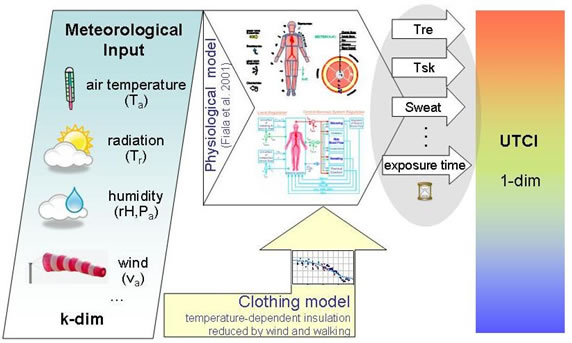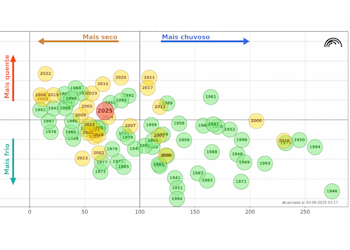News
-
A Perspective on the Oceans
-
Scientific Paper FVON
-
Climate Bulletin Summary May/2025
Universal Thermal Climate Index
The recommendations from COST Action 730 (2009), which developed the new Universal Thermal Climate Index (UTCI), encouraged the IPMA, to develop and implement a new operational application to allow dissemination of its results and also to characterize a spatial variability of UTCI on the mainland territory.
The new index UTCI can be applied to all climates and to any spatial scale. It takes into account the exchange of heat flows and thermal regulation of the individual, reflecting a great concern in the modelling of energy balance, by considering the local thermal effects throughout the body. This index takes into account the reference activity of a person with a speed of 4 km/h, being independent of the personal characteristics of each individual.
The Figure 1 describes the way UTCI was developed, based on meteorological variables, the model of thermo-regulation Fiala (Fiala et al, 1999, 2001, 2003), and also the model developed for adaptive clothing (Richards & Havenith, 2007).

Figure 1– UTCI's climate access, calculated from a thermo physiologic model and a thermal manikin (COST Action 730).
The reference terms for UTCI calculation are:
- Wind speed (v) 0.5 m / s at 10 meters height (approximately 0.3 m / s at 1.1 meters);
- Mean radiant temperature (MRT) is equal to air temperature;
- The activity (M) of a person moving with a speed of 4 km / h. This equates to a rate of metabolism of 135 W m-2;
The UTCI is calculated on the basis of a polynomial to the sixth order in T, v10m, and TMR.
UTCI temperature, for a given combination of wind, radiation, humidity and air temperature, is defined as the air temperature in the standard condition of such weather elements for which the index is calculated. According to the COST Action 730, the UTCI awareness uses the following scale (Table 1):
| UTCI (°C) | Classificação de Stress |
|---|---|
| Superior a +46 | extreme heat stress |
| +38 to +46 | very strong heat stress |
| +32 to +38 | strong heat stress |
| +26 to +32 | moderate heat stress |
| +9 to +26 | no thermal stress |
| 0 to +9 | slight cold stress |
| 0 to -13 | moderate cold stress |
| +-13 to -27 | strong cold stress |
| -27 to -40 | very strong cold stress |
| below a -40 | extreme cold stress |
The UTCI published daily online by the IPMA, is calculated for 8 different times, based on 8 observations at 00, 03, 06, 09, 12, 15, 18 and 21 UTC.




